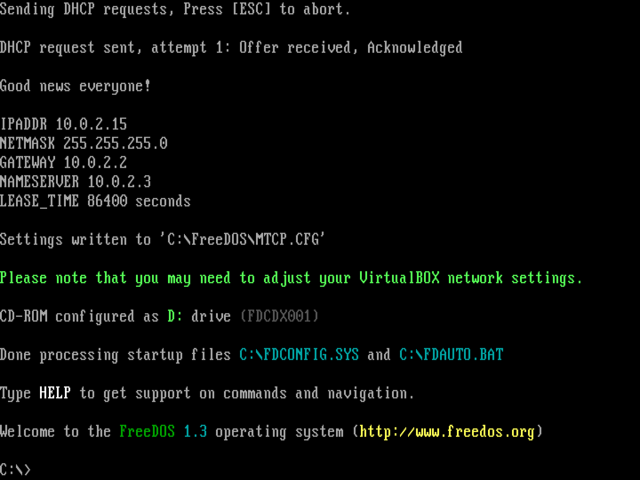Play classic games
You can play your favorite DOS games on FreeDOS. And there are a lot of great classic games to play: Wolfenstein 3D, Doom, Commander Keen, Rise of the Triad, Jill of the Jungle, Duke Nukem, and many others!

FreeDOS is an open source DOS-compatible operating system that you can use to play classic DOS games, run legacy business software, or write new DOS programs. Any program that works on MS-DOS should also run on FreeDOS.
You can play your favorite DOS games on FreeDOS. And there are a lot of great classic games to play: Wolfenstein 3D, Doom, Commander Keen, Rise of the Triad, Jill of the Jungle, Duke Nukem, and many others!
You can run your favorite DOS programs with FreeDOS. Or use FreeDOS to run a legacy DOS application. Just install your DOS program under FreeDOS like you would any DOS application and you'll be good to go.
FreeDOS includes lots of programming tools so you can create your own DOS programs. You can also modify FreeDOS itself, because we include the source code under an open source license.
MGRX is a 2D graphics library derived from the GRX library. MGRX supports DOS using DJGPP (with djdev 2.05, gcc 7.1.0) and supports VGA and VESA compliant cards. Global dependencies, for all platforms, are libjpeg for reading and writing JPEG files, and libpng and zlib for reading and writing PNG files. MGRX is distributed under the GNU Library General Public License, with amendments - read copying.grx for details. You can download version 1.5.1 from the MGRX website. Read the changes.txt file for the full list of what's new.
Zerofill writes zeros on the empty disk space for the selected drive. It can help virtual machine and disk compression software to better compact the allocated space in the volume, and so on, reducing its disk usage. Javier has released Zerofill 2.01 with several new features: + Support extended FAT32 drives with 7305 DOS service if available + Increased speed by generating temporary 1GB files (instead of 500MB files as in previous version) + Changed temporary file naming convention + Added a question to confirm deletion of temporary files + other smaller code updates. You can find it on the Zerofill web page.
If you're following along with the latest development tools, you may be interested in JWasm, a MASM-compatible assembler. Version 2.19 was released today and includes several bugfixes and other changes. A few highlights: format mz: stack segment was never written, format mz,pe: start offset for first segment may have resulted in an invalid binary, write listing reworked, PUSHW will emit warning "magnitude of offset exceeds 16-bit" if operand is a 32-bit offset, and using 'option oldmacros' will cause a warning only. You can find it at JWasm on GitHub, under release v2.19. We've also mirrored this in the FreeDOS Files Archive at Ibiblio, under /devel/asm/jwasm
Bernd has been working hard to update FreeDOS FDISK before the FreeDOS 1.4. RC2 distribution in a few weeks. Bernd just released FDISK 1.4.3 that fixes a display bug when showing driver "letters" beyond Z. See the change log for a full list of what's included. Please test with this version if you already downloaded an earlier FDISK. Get the new release from FDISK at GitHub.
7-Zip is a file archiver, and Darik Horn's Retro7zip is a native backport of 7-Zip for DOS. Darik has released 7-Zip version 24.09+3 for DOS, with these changes: + 7zdec is now bundled and just 45 KB on disk + crash in the RAR codec is resolved + WAV files now get delta filtering by 7zm + more kinds of DOS are recognized for LFN. You can download the new 7-Zip at the retro7zip GitHub.
Bernd has released FreeDOS FDISK 1.4.2 with several important fixes. See the change log for a full list of what's changed. Highlights include: Prevent FDISK from accessing and modifying partitions with more than 23 logicals defined, fix bootloader trying to boot from an active partition not containing a valid volume boot record, and only complain about an unusable extended partition if there is any defined (not when there is no extended at all). Get the new release from FDISK at GitHub.
Here's the announcement about version 1.4.0, from a few days ago: Bernd released FDISK version 1.4.0 with many important fixes. See the change log for a full list, including: fixes related to logical partitions, fixes that prevent the user from accidentally deleting the wrong partition, fixes related to many logical partitions or multiple disks, and some command line changes. Download the new version from FDISK on GitHub.